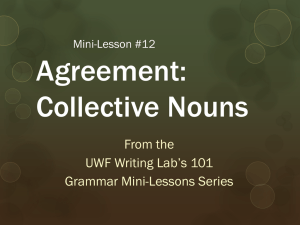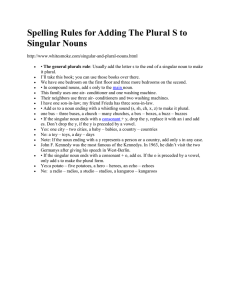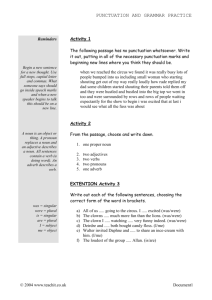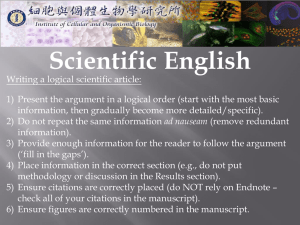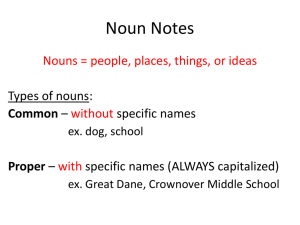How to Choose Appropriate Articles 80% of the Time
advertisement
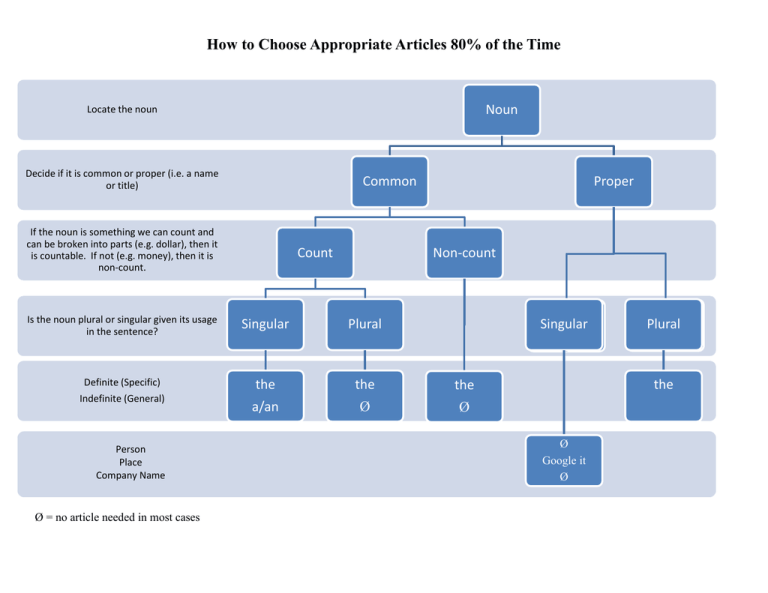
How to Choose Appropriate Articles 80% of the Time Noun Locate the noun Decide if it is common or proper (i.e. a name or title) Common If the noun is something we can count and can be broken into parts (e.g. dollar), then it is countable. If not (e.g. money), then it is non-count. Count Proper Non-count Is the noun plural or singular given its usage in the sentence? Singular Plural Definite (Specific) the the the a/an Ø Ø Indefinite (General) Person Place Company Name Ø = no article needed in most cases Singular Singular Plural Plural the Ø Google it Ø Examples: 1) She was strongest weightlifter on team. The first noun, weightlifter, is common and countable (it is a discrete unit), and it is singular. Now, I need to consider the meaning of the sentence to decide between definite (the) and indefinite (a/an) articles. The word “strongest” refers to only one person, so I know that the meaning is definite. I should use “the” before strongest. The second noun, team, is common, countable, and singular. Since I am talking about one particular girl, the meaning of team seems to be definite. I should add “the” before team. Rewritten sentence: She was the strongest weightlifter on the team. 2) Genetically-modified plants are increasingly common in American marketplace, raising concerns over long-term health effects. This sentence contains three nouns (plants, marketplace, and effects). Plants: common, countable, plural. The meaning of plants also seems to be general as we are not talking about specific genetically-modified plants: rather, we are talking about a general group. Here, the meaning seems to be including all genetically-modified plants. Marketplace: common, non-count (the noun is not a discreet unit that can be broken into parts). Now for level of specificity. American is a specific adjective indicating that we are really only concerned with one marketplace. Thus, “the” should appear before “American marketplace.” The third noun is “effects”: common, countable, and plural. The words “long-term health” could either indicate a definite (specific) or an indefinite (general) meaning. If I had already mentioned these long-term health effects, then I would use “the” before “long-term” because I would be referencing something that I had already established. If this were the first time I mentioned these health effects, then I would want to not use “the” before “long-term” because my meaning would be more general. Rewritten sentence: Genetically modified plants are increasingly common in the American marketplace, raising concerns over long-term health effects. Practice: 1) Carbon dioxide levels have increased dramatically since industrial revolution in 1800s. 2) Combining disciplines while researching can lead to helpful a helpful grant money since interdisciplinary work is often innovative. The Flow Chart with More Explanation In English, articles (a, an, the, some) can be pretty tricky because article usage relies on the noun itself as well as its meaning (what specific meaning the noun conveys). Below is a method to demystify the process of choosing the appropriate article. The Steps: 1) Identify the main noun —be careful not to choose a noun that is functioning like an adjective (i.e. “race horse,” horse is the main noun) 2) Decide if the noun in its current usage is common or proper —common nouns are everyday nouns (e.g. cat, pencil, money) —proper nouns start with a capital letter and are names or titles (e.g. Bill, President Lincoln, Microsoft) 3) Determine if the noun, given its current usage and meaning, is countable —a countable noun is a word that can exist in a discreet, individual unit (e.g. coins, goose, students) —a non-count noun is thought of as a whole and cannot be broken into parts (e.g. money, education, weather) Example: Think about mashed potatoes. Before they are chopped, boiled, and mashed, potatoes are countable. We can count each one individually. Once they become mashed potatoes, the potatoes cannot be broken into individual parts. 4) Identify if the noun is singular or plural in its current usage —pay particular attention to collective nouns (like committee) as some collective nouns, depending on context, can be considered either plural or singular. 5) Conclude if the noun’s meaning is specific (definite) or general (indefinite) —this step is one of the most difficult as your intended meaning should dictate specificity, not the noun’s definition. 6) If the noun is proper and singular, then decide what the name denotes. Is it a person, place, or company? —Singular names of people typically do not use an article (e.g. Jane Doe) —A singular name of a place may use an article, so we suggest Googling the name to check (e.g. the Grand Canyon, Porter Hall) —Singular company names usually do not require articles (e.g. Apple, Google, Carnegie Mellon)
